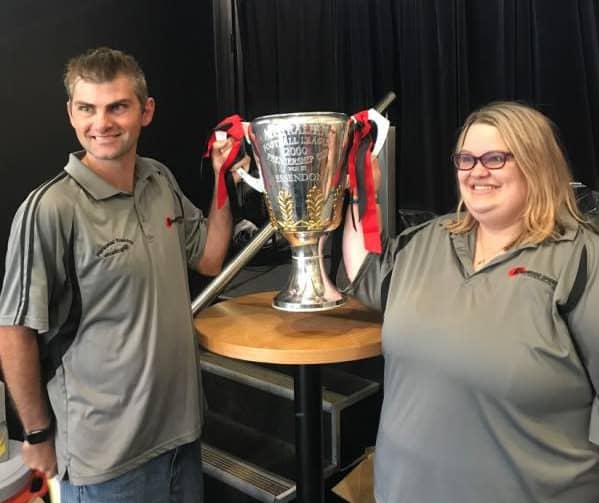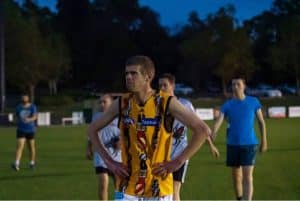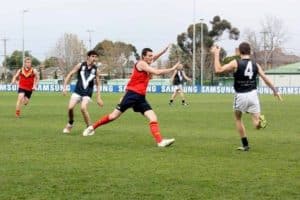Utilising your NDIS plan for sport and personal growth
As MediStays latest Pledge1% partner, we spoke with the founder of the Victorian FIDA Football League (FIDA), Peter Ryan. We share more about common goals between MediStays and FIDA, and how the pledge will support inclusive footy in Australia on this blog post.
Here, we are going to focus on the benefits of joining an inclusive sports team for people with an intellectual disability, and how participants of the NDIS can utilise their plan to play the game.
What is the Victorian FIDA Football League?
FIDA was founded over 30 years ago by Peter Ryan. At that time he worked teaching in a special school. A footy enthusiast, he also worked part-time as a recruiter at the Hawthorn Football Club. An opportunity arose to combine the two, so Peter ran a football clinic for people living with an intellectual disability.
The clinic was a success. Noticing the value for the community, Hawthorn City Council empowered Peter to facilitate more clinics.
In 1991, matches were taking place with FIDA teams. Jump to now, and FIDA is represented by over 800 players. Players whose teams are now associated with 28 football clubs in Victoria.
Inclusivity is at the heart of what FIDA does. And not just for footy (although it is the key avenue). Peter utilises his experience teaching at special schools to continue the growth and education of FIDA players.
Presentation nights are regularly hosted for players throughout FIDA’s 28 clubs. Anything from budgeting skills to trying new hobbies can be included. As a valuable and intentional ‘by-product’, social interaction and building confidence takes place.
Social and Community Participation with the NDIS
Peter also highlighted how the NDIS plan can go towards social and leisure activities for participants of the NDIS.
Not only is it worthwhile, but also vital. Adequate support from carers and sufficient funding are crucial aspects to making sports accessible for those living with a disability.
Thankfully, in Australia, National Disability Services (NDS) developed the Community Inclusion Initiative to “help inform the provision of community participation support under the NDIS”. The National Disability Services website states that this initiative “is included in 50 per cent of all plans for NDIS participants, making it the second most funded support”.
Peter is very grateful for the extent that NDIS plans and funding can support social and leisure exploration for its participants, and thinks it is a fantastic program.
However, Peter does acknowledge that, due to its complexity, NDIS support can be difficult to navigate. A lot of people aren’t aware of the full extent that the NDIS can be utilised for sporting activities.
How can I use my NDIS funding to play sports?
Peter can confirm that registration fees are eligible for NDIS funding when playing sport is part of a participant’s program.
Yet it can go beyond just paying for club fees and sports gear.
It can also include a carer to support someone to get ready for their training or game, provide transport to and from the game, and be present during training and games.
As far as carers and support workers travelling away from home, to get to an away game, this is not a situation that has come up yet. There is obviously an increased level of challenges when travelling to away games, and ensuring players’ confidence, support and care for this is key. However, FIDA hopes to expand the spectrum of ability able to travel for competitions as inclusive footy continues to grow.
Peter doesn’t claim to be an expert of NDIS funding possibilities. So he can’t vouch for every NDIS Plan having subsequent funding applied to travel and accommodation for sport teams. However, he does encourage participants and their supports to enquire as to what is possible.
Sarah Everitt, MediStays Managing Director, explains that MediStays is delighted to support participants of the NDIS to plan excursions. Our Care Navigators can book Short Term Accommodation (STA) when it aligns with their NDIS plan goals. “STA is an excellent way for people to experience new things. It can also give much needed respite to informal carers in the home”, Sarah shared.
MediStays also offers STA Packages to make booking your stays away even easier.
Supporting the core purpose of the NDIS
Peter believes there are many aspects of the NDIS program that are currently under-utilised. Meaning, they haven’t been taken up to the full extent possible. Peter emphasises that the NDIS is still relatively new. He hopes that over time, accessing funding options will be refined to the best fit for each participant’s development.
Peter says that parents of a person with an intellectual impairment can bear many concerns on the long term future of their child. It’s often a massive burden on their minds as to what will happen when they are no longer there to care for their child.
The core purpose of the NDIS is ensuring their child is supported and empowered to live their life – safe and content. One of its basic aims is to ensure parents’ fears are alleviated.
Knowing this support system is there for their children goes a long way to relieving parents’ mental burden. It’s a vital part of the NDIS, and also why Peter and FIDA place such an importance on social interaction, life skills workshops and community support for their programs.
FIDA and MediStays: Working together for players of all abilities
Both FIDA and MediStays hope to see the underutilisation of NDIS Plans rectified in the future.
This is one of the key reasons MediStays has their wonderful Care Navigators. They help participants of the NDIS (and their referrers) navigate their funding options for Short Term and Medium Term Stays.
MediStays has flexible NDIS accommodation options. Participants of the NDIS and their Support Coordinators can organise to have the right carers present in order to be able to participate in sport and leisure activities while playing away from home.
There are many different ways the NDIS funding can be utilised. There are multiple supports that assist participants to play, additional to direct costs.
The funding and support making inclusive footy possible
Funding for support workers’ time is an important consideration that often gets overlooked.
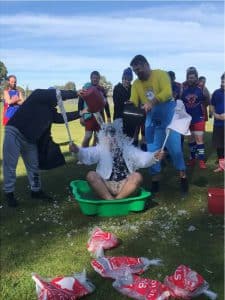
FIDA strives for all willing players to be included in footy, despite their ability level. Yet it takes a lot of careful planning and resources to facilitate these spaces and opportunities.
So additional support from paid carers and support workers, as well as informal support networks, is relied upon. It is critical in making the important work FIDA does possible.
MediStays’ Care Navigators can support FIDA players’ accommodation bookings for away games. They can also provide support navigating various options for NDIS funding.
Short-Term Accommodation (STA) is a great way to achieve this. It could look like a stay in the city for a participant to try out inclusive footy for themselves. Or, travelling state wide or interstate to take part in a competition.
Whatever the unique situation, the MediStays platform and our wonderful Care Navigators can support those living with an intellectual disability to expand their horizons.
FIDA’s inclusive footy and its opportunities for social and community participation are the perfect avenue to:
- improve confidence
- make goals for personal growth
- meet people through new experiences
Creating space: inclusive sport for all
One of the things FIDA is currently working on is developing a female-only competition.
Current FIDA player numbers:
- Around 800 players altogether
- Around 80 female players
This year’s first steps will be the facilitation of two or three female-only games. At present, female players are playing alongside males. However, this may not be ideal. So these new games will go a long way to improving inclusivity and accessibility. For optimum growth and empowerment, female players (both existing and potential), should have access to as many female-only options as possible.
One of the challenges of this is getting the number of female players up. Getting up to 80 has been a huge milestone for female-only play. And once the 100 player milestone is reached, FIDA will be able to facilitate a few regular female-only games.
FIDA has also held a game only for players with Down syndrome. This is another group within our communities that FIDA hopes to provide more opportunities and support for.
As Peter says,
“FIDA is proud to have reached the milestone of 800 players. But this is really just scratching the surface for the people inclusive footy could be reaching (in Victoria and beyond). We are really keen to have teams in more areas. So far, we are connected with three community clubs in Melbourne wanting to form a dedicated team over the next few years. And as FIDA, we want to support these clubs the best we can”.
FIDA supports a wide range of abilities, and tries to cater to them in as personalised a way as possible, such as the ‘tackle free’ adaptations.
Supporting organisations for the FIDA mission
State-to-state, there are other organisations running programs. FIDA works alongside them for interstate competitions. More locally in Victoria, FIDA works closely with relevant organisations to support the expansion of opportunities and accessibility to anyone wanting to play.
As mentioned above, FIDA is currently working to facilitate the right environment and opportunities for both female players and players with Down syndrome.
How can sport be more accessible & inclusive?
We asked Peter what sort of support FIDA and their players need to expand. Not only to specific games, but also specific competitions. Overall, to make footy inclusive to the many groups that experience accessibility barriers to playing the game.
Peter says the Down syndrome game two years ago was a great success. Naturally, some people have questioned ‘why just Down syndrome?’. It is an important question, as FIDA does want to support groups of every intellectual disability. However, that game was a great starting point for getting specialised games off the ground. Down syndrome is an impairment that could be fairly identified and categorised. This ensured players were on a level playing field – resulting in good, clean fun!
This template will be developed by FIDA to scale other specially adapted games and competitions. It was a great way to get proof of concept, showing there can be an entry point for all levels of ability. This ‘prototype’ also provides a blueprint for repeating the same success across other sports and activities.
Peter puts the success of that game down to another important organisation: Down Syndrome Society. FIDA works very closely with them, and the exemplary services and support they provide. Dedicated organisational and community support makes specialised games and competitions possible.
FIDA’s experience creating and supporting a community
While Peter is a self-confessed footy nut, he says it’s not just about the footy for FIDA. Their intention is also to build a supportive community. One that empowers players to live more independent and fulfilling lives.
Another really great aspect of their program is the presentation nights. Even just seeing the social interaction between the players is so rewarding. And to see their confidence and self esteem grow so much since becoming part of the team. For Peter, that is one of the most fulfilling parts of what FIDA does.
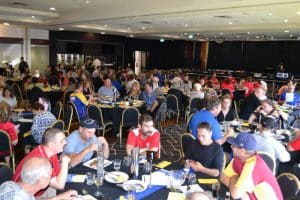
Beyond the social interaction after the game, FIDA also encourages its clubs to do educational things. For example, workshops to build life skills like budgeting. Peter says it can be anything, really. But, informed by his background as an educator in special schools, he knows that once intellectually impaired adults leave school there aren’t as many opportunities for them to continue growing their skills and knowledge.
A lot of times, parents and informal caregivers unfortunately don’t have the resources to support ongoing growth and development on their own.
A holistic approach to social and leisure inclusion
Peter sees club interactions as opportunities to support all of its members in various ‘non-footy’ ways. He feels programs with this holistic approach to social and leisure inclusion are actually quite rare.
School leavers with an intellectual disability may or may not get a work placement. Being part of a team can be really important to their ongoing development. Access to club presentation nights can provide ongoing connection for social satisfaction and personal development.
This ties in to our collective community responsibility. When a FIDA player comes to the club to play footy, they’re not just there to play a game and then go home again. They are part of that community.
For many reasons, FIDA likes to link their club to a mainstream community club. This is of course a two-way street. The existing club members learn from interacting with the FIDA players, just as much as the other way round. They can learn more about the individuals, as well as the intellectual impairments they live with.
This means learning to be more inclusive, as well as developing team player and leadership skills. Overall, meeting new people and personalities they otherwise may not cross paths with. To Peter, that is the vital part of FIDA connecting with mainstream footy clubs.
Understanding diversity as a part of everyday life
Peter himself can relate to the importance of increasing these opportunities for more diverse connections. When he first started teaching at a special school, he knew very little about intellectual disability. Nor had he previously interacted closely with people living with intellectual disability.
However, Peter was immediately impressed with the way the staff handled the challenges. He now has a great niece with Down syndrome. His experience has helped him to appreciate the challenges her parents have gone through. And of course, his grand niece is just absolutely fantastic!
The needs and desires of those living with an intellectual impairment are just as important as anybody else’s. Human beings’ core needs go beyond shelter, nutrition and sleep. Purposeful relationships, hobbies, work and goals are just as important.
Utilising NDIS Plans and support for FIDA programs
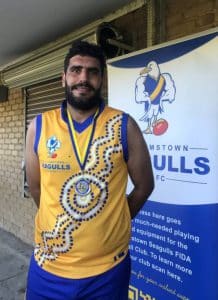
Part of FIDAs own goals is to keep increasing their own knowledge of what’s available and which support services can be used. Another branch of this is FIDA’s goal to keep raising awareness of the programs they run. Peter wants to showcase the incredible value of this work. Essentially, the universal importance of social and leisure inclusion in Australia.
Peter says that the footy is great, and they couldn’t do it without the footy. But the goal is to provide an overall program of continued service to people with an intellectual impairment.
FIDA works very closely with Sport Inclusion Australia to ensure programs align with their guidelines. And another bonus of this great relationship is access to some of their experience.
Two years ago FIDA players went to their Global Games in Brisbane. And this year in 2022 FIDA teams will be attending the Asia Pacific Games (run by Sport Inclusion Australia). FIDA will be taking a team up there for an exhibition game, with the aim to showcase inclusive footy and what’s possible. Peter hopes to secure an international team, such as New Guinea, to come and play against Australia. He remarks that “if not this year, then perhaps in future they can”.
How can groups or individuals get involved with the Victorian FIDA Football Association?
There are many different levels of abilities and needs that can get involved with footy with the right adaptations, environment and supports in place.
So whether you are an individual with an impairment, a person who supports them or an organisation or group working with specific types of impairments, FIDA would love to hear from you!
It’s key for FIDA to connect with and understand the needs of all people keen to get on the footy fields. The more players FIDA has across the full spectrum of ability, the more they can grow dedicated teams, games and competitions suited to every type of intellectual and physical ability.
If you think footy is something that you or someone you know would like to get involved with, take a look at the FIDA website. It’s a great place to read the FIDA story in full, and check the video and photos showcasing their programs and events.
From there, you can get in touch with the team at FIDA and find out what could be possible. Peter and the team are happy to answer any questions and appreciate every enquiry they receive.
Are you a participant of the NDIS who would like to travel for a sports competition or community activity? MediStays offers Short Term Accommodation options that work with your NDIS Plan. Our Care Navigators can work with your Support Coordinator and Plan Manager to find the right accommodation for you. You can get in touch with our Care Navigators to find out more.
